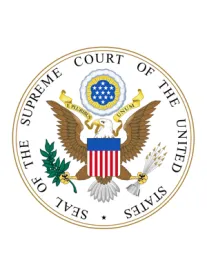On the last decision day of the term, the Chief Justice put on his AMK hat, casting the decisive vote on opposite (political) sides in the two most politically salient cases of the term, involving the census and partisan gerrymandering.
In Department of Commerce v. New York (No. 18-966) (consolidated with Lamone v. Benisek), the Chief sided with (and, in part, wrote for) the more liberal Justices in concluding that the Commerce Department’s stated basis for adding a citizenship question to the 2020 census—that it was necessary to improve enforcement of the Voting Rights Act—was inadequate and essentially pretextual. The Court, therefore, agreed with the District Court that remanding to the Commerce Department for a more reasoned explanation is necessary and appropriate. That’s a major loss for the Trump Administration, as you can tell from the presidential tweets. However, the Chief agreed with the conservative Justices that there is nothing inherently wrong with adding a citizenship question and that doing so would not violate the Census Act or the Enumeration Clause of the Constitution. Accordingly, if the Commerce Department (consistent with the requirements of the Administrative Procedure Act) provided a better explanation for adding the citizenship question, a majority of the Court would presumably allow it. But all along, the Government has insisted that the census questionnaire must be finalized by June 30, which would make it impossible to comply with the Court’s directives. Many have questioned this deadline, however, so it remains to be seen whether the Administration can take another crack at this before the actual deadline for finalizing the questionnaire. (Separately, the Fourth Circuit recently affirmed a judgment enjoining the Department from adding a citizenship question on equal protection grounds. The Court did not address that unbriefed issue—despite a Government letter requesting it to—so that remains an obstacle to any further effort to add the question based on new reasons.)
On the whole, the census case goes down as a win for progressives and a stinging loss for the Trump Administration. In the other mega-case of the term, however, Rucho v. Common Cause (No. 18-422), the Chief sided with (and wrote for) the other conservatives in holding that partisan gerrymandering claims present nonjusticiable political questions beyond the reach of the federal courts. This provoked a stirring dissent from Justice Kagan, who denounced partisan gerrymandering as “debas[ing] and dishonor[ing] our democracy,” and castigated the majority for refusing to remedy an acknowledged constitutional violation just because it would be too icky.
Finally, in Mitchell v. Wisconsin (No. 18-6210), a splintered Court held that, when a driver is unconscious and cannot be given a breath test, the exigent-circumstances doctrine generally permits a blood test without a warrant. Justice Alito wrote for a plurality consisting of Roberts, Kavanaugh, and Breyer, with Justice Thomas (who would hold that the exigent-circumstances doctrine permits a blood test even if the driver is conscious) providing the fifth vote. Justice Sotomayor dissented, joined by Ginsburg and Kagan. Justice Gorsuch also dissented, but for different reasons. He noted that the Court had granted cert to decide whether Wisconsin driver’s impliedly consent to blood alcohol tests merely by the act of driving (as provided in a state statute), not whether the exigent circumstances doctrine applies. He, therefore, would have dismissed the writ as improvidently granted.
What about that last case? In Carpenter v. Murphy (No. 17-1107) the Court punted on one of the most fascinating questions of the term—whether a huge swath of Oklahoma is actually still “Indian country” belonging to the Creek Nation, meaning that the State lacks jurisdiction to prosecute criminal offenses committed by members of the Nation. Without comment, the case was restored to the calendar for reargument next term. This is both unexpected and a bit puzzling. While the Court may have been trying to avoid a 4-4 split, the potential for a split was not due to Justice Kavanaugh’s late arrival, but to Justice Gorsuch’s recusal, due to his peripheral involvement in the Tenth Circuit’s consideration of the case. Assuming that Gorsuch doesn’t suddenly un-recuse, it’s not entirely clear how the Court expects to reach a majority next term.
We’ll have plenty more to say about the census, partisan gerrymandering, and unconscious blood draws in due course. But while we’re in catch-up mode, please read on for our summary of another important case from earlier in the week, Iancu v. Brunetti (No. 18-302), which addressed what is indisputably the most FUCT question of the Term. (Sorry mom, couldn’t resist!)
As a young man, Erik Brunetti started a successful clothing company with the brand name FUCT. It stood for “Friends U Can’t Trust,” he’s said, but from the get-go he wanted people to question its pronunciation. Brunetti says it’s properly pronounced one letter at a time, but as Justice Kagan said in her opinion for a seven-justice majority, “you might read it differently and, if so, you would hardly be alone.” When Brunetti tried to trademark the name, the U.S. Patent and Trademark Office (PTO) said no, invoking a Lanham Act exception to trademark registration that prohibits registration of “immoral or scandalous matter.”
As you may remember, two terms ago, in Matal v. Tam (2017)—a case involving an effort by the band The Slants to register a name the PTO concluded was disparaging to Asians—the Court held that the Lanham Act’s prohibition on the registration of “disparaging” trademarks infringed the freedom of speech under the First Amendment. The majority in Iancu concluded that this was essentially Tam II. Asking the Government to decide what’s “immoral” or “scandalous” is straight-up viewpoint discrimination. Under the “immoral or scandalous” exception, “marks that champion society’s sense of rectitude and morality” can be registered, “but not marks that denigrate those concepts.” And “the Lanham Act allows registration of marks when their messages accord with, but not when their messages defy, society’s sense of decency or propriety.” Justice Kagan spent a couple of pages cataloging how that’s played out at the PTO in real life. BONG HITS 4 JESUS? No registration, because “Christians would be morally outraged.” JESUS DIED FOR YOU on clothing is okay, but FUCT on clothing is not, because that “vulgar” term communicates “misogyny, depravity, violence” and is “extremely offensive.”
Much of this is uncontroversial, and even the Government pushed back only a little. It acknowledged that viewpoint discrimination in trademarks is unconstitutional, but it asked the Court to narrow the statute to cover only marks found offensive or shocking “because of their mode of expression, independent of any views that they may express.” Justice Kagan wrote that while the Court will generally construe ambiguous statutes to avoid constitutional problems, this statute is not ambiguous: it “does not draw the line at lewd,” but instead “covers the universe of immoral or scandalous,” “whether the scandal and immorality comes from mode or instead from viewpoint.” The majority pointedly said “nothing at all” about whether a statute limited purely to the mode of expression—prohibiting “lewd, sexually explicit, and profane marks”—would pass muster.
Justice Alito, concurring, said such a statute would be just fine. After all, he said, a mark like FUCT “is not needed to express any idea and . . . generally signifies nothing except emotion and a severely limited vocabulary.”
In three separate opinions, the Chief, Justice Breyer, and Justice Sotomayor each said that such a statute was already on the books, or could be with a little tweaking. While they each agreed that the “immoral” part of the statute had to go, they argued that the “scandalous” part could be salvaged by reading it narrowly to cover only modes of expression. Justice Breyer and Justice Sotomayor each also suggested that truly odious marks could be tantamount to fighting words or obscenity and could expose children in public spaces, concerns that they thought justified a prohibition on such marks. (As Justice Breyer noted, the FUCT label is in fact used on kids and infant clothing. U can’t trust anyone, babies.) The dissenters also each emphasized that Brunetti, and others like him, could still use profanity on their products, and could even treat them as trademarks; the only consequence of not being able to register scandalous modes of expression was that the owners would lack certain statutory protections that registration provides in trademark litigation.
So, at the end of the day, six Justices agreed that the provision of the Lanham act prohibiting “immoral and scandalous” trademarks is unconstitutional. But four Justices are also on the record stating that a statute that prohibited only the registration of scandalous modes of expression would be just fine, with the other five saying “nothing at all” about it. If “infrastructure week” hasn’t entirely panned out as a show of bipartisanship, a bill banning the registration of trademarks using curse words on children’s clothing might just do the trick. We’re shocked that it wasn’t a Biden cross-aisle talking point at tonight’s debate.
That’s all for now, but we’ve got plenty more in the hopper. Although all 71 opinions are now in the books, The Nine will in fact be back tomorrow to issue additional orders. We’ll update you on those as we work through the logjam in the end-of-term deluge.





 />i
/>i

